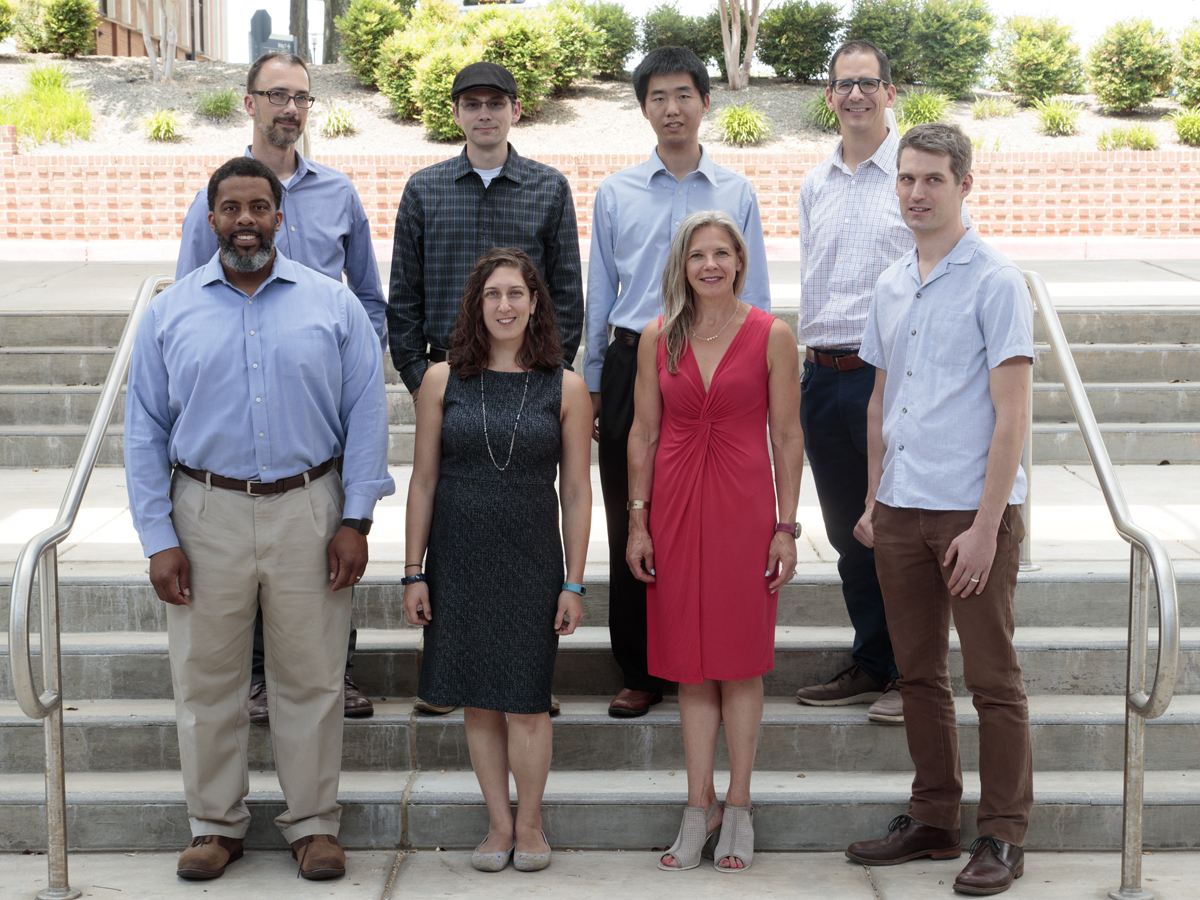Press Release
New Doctorate of Engineering Program Underway with Eight APL Staff Members
Eight staff members from the Johns Hopkins Applied Physics Laboratory (APL) in Laurel, Maryland, are the first cohort of students accepted into a new doctor of engineering degree program conferred by the Johns Hopkins Whiting School of Engineering in partnership with APL.
The pilot cohort includes Myron Brown, Jeffery Chavis, Peter Gu, Jennifer McKneely, Seth Myers, Kara Shipley, Bart Paulhamus and Peter Thielen. Most indicated that they had always wanted to obtain a doctorate, but the increasing responsibilities of work and family made pursuing an advanced degree difficult.
Chavis always thought he’d pursue a doctorate after obtaining bachelor’s and master’s degrees in electrical engineering. “My father was a Ph.D., and I wanted to emulate him,” said Chavis, a project manager in APL’s Homeland Protection Mission Area and the chief engineer in the Asymmetric Operations Sector’s Applied Information Science Branch. But his father was battling multiple sclerosis, and Chavis admits he was a little burnt out. “I thought I’d take a year or two off [from graduate work], and that became almost 30 years!”
Similarly, Myers — an engineer in APL’s Force Projection Sector — said he had always intended to follow up his mechanical engineering degrees with a doctorate, but the desire to go back to school took a back seat to the demands of professional and family life. “The reality of starting further graduate studies was perpetually a year or two away for me,” he said.
The new doctor of engineering (D.Eng.) was designed with the needs of working, mid-career engineering professionals like Chavis and Myers in mind. Like traditional Ph.D. programs, its foundation is a candidate’s advanced research guided by a faculty advisor.
But unlike traditional Ph.D. programs — which tend to emphasize foundational work to further the body of scientific or technical knowledge — the D.Eng. program is application-based, focusing on engineering advances such as prototypes, inventions and new software. Students shape their program to meet professional goals, and immediately contribute to their current job responsibilities.
Gu has been working for more than three years on a simulation for U.S. border patrol operations. But as interest builds in border security, so has the program sponsor’s interest in modeling and simulation — and now Gu is working with a team of engineers to rebuild the simulation from scratch. “In order to create a better model, I need to master machine learning and optimization,” he said, “and this degree program is going to allow me to do that while continuing to serve the Laboratory and the sponsor.”
It takes the average student five years to complete a doctorate after obtaining a bachelor’s degree; the new program is designed to be finished in three years after an M.S. degree in engineering or a related field.
In lieu of the traditional dissertation, D.Eng. students can present their research results as a portfolio that can include prototypes, videos, simulations, patent applications, and the reports and papers from APL Independent Research and Development grants and projects.
“My career path has largely focused on laboratory-based experimentation. The opportunity to continue expanding work in new research areas while pursuing a doctorate is especially motivating,” said Thielen, a molecular biologist with a bachelor’s degree in molecular biology and biotechnology and a master’s in biotechnology. “As a researcher, the institutional support at APL has been second to none, and the opportunity to advance my education while contributing to critical challenges is an exciting opportunity.”
“I think in five years’ time, people will forget this is a new program because it just makes sense,” added Shipley, an assistant section supervisor with a B.S. in physics and an M.S. in mechanical engineering. “I expect that merging research we do on a daily basis with a more structured format will result in better products: both the program project and all future projects of the participants.”
The new collaboration between the Whiting School of Engineering (WSE) and APL is unique in merging advanced engineering development with academic research, noted APL Chief Technology Officer Jerry Krill. “To ensure that the program is broad in technical perspective, it is administered at the dean’s office level, not within any individual department of WSE,” he said.
Krill and Harry Charles — head of the APL Education Center and associate dean of WSE — both said that the D.Eng. program will strengthen teamwork between APL staff and WSE faculty, and perhaps inspire whole new lines of engineering pursuit.
Prospective students can learn more about the program and ask questions Thursday, Aug. 23, 4–5 p.m. EDT, in an online information session hosted by JHU’s Ed Scheinerman, Vice Dean for Graduate Education at WSE and chair of the Doctor of Engineering Oversight Committee. Register Here.
The D.Eng. program and the dissertation educational benefit are the newest additions to higher education programs at APL. APL’s Strategic Education Program offers on-site, not-for-credit courses taught by APL experts in areas of strategic importance to the Laboratory’s technical professional staff. The largest graduate education program available for APL staff members is Engineering for Professionals, a partnership between WSE and APL that is the largest master’s degree program of its kind in the United States. APL staff members chair 11 out of 20 EP programs that produce nearly 90 percent of the 600-plus annual master’s degree graduates.
